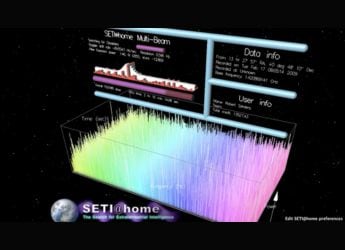- Home
- Science
- Science News
- Japan Space Probe Launches New Robot Onto Asteroid
Japan Space Probe Launches New Robot Onto Asteroid

A Japanese probe launched a new observation robot towards an asteroid on Wednesday as it pursues a mission to shed light on the origins of the solar system.
The Hayabusa2 probe launched the French-German Mobile Asteroid Surface Scout, or MASCOT, towards the Ryugu asteroid's surface, the Japan Aerospace Exploration Agency (JAXA) said.
"We can confirm that the MASCOT separated from the spacecraft as planned," the agency said in a tweet on its official account.
It was not clear how long it would take for confirmation of the robot's safe landing on the asteroid, where it is expected to collect a wide range of data.
"It is hugely significant to take data from the surface of an asteroid, we have high expectations for the scientific data," Hayabusa2 mission manager Makoto Yoshikawa said at a briefing before the landing.
The 10-kilogramme (22-pound) box-shaped MASCOT is loaded with sensors. It can take images at multiple wavelengths, investigate minerals with a microscope, gauge surface temperatures and measure magnetic fields.
MASCOT's launch comes 10 days after the Hayabusa2 dropped a pair of MINERVA-II micro-rovers on the Ryugu asteroid - a world first.
Unlike those machines, MASCOT will be largely immobile -- it will "jump" just once on its mission, and it can turn on its sides.
And while the rovers will spend several months on the asteroid, the MASCOT has a maximum battery life of just 16 hours, and will transmit the data it collects to the Hayabusa2 before running out of juice.
The Hayabusa2 is scheduled later this month to deploy an "impactor" that will explode above the asteroid, shooting a two-kilo (four-pound) copper object into it to blast a small crater on the surface.
The probe will then hover over the artificial crater and collect samples using an extended arm.
The samples of "fresh" materials, unexposed to millennia of wind and radiation, could help answer some fundamental questions about life and the universe, including whether elements from space helped give rise to life on Earth.
Hayabusa2, about the size of a large fridge and equipped with solar panels, is the successor to JAXA's first asteroid explorer, Hayabusa -- Japanese for falcon.
That probe returned from a smaller, potato-shaped, asteroid in 2010 with dust samples despite various setbacks during an epic seven-year odyssey and was hailed as a scientific triumph.
The Hayabusa2 mission was launched in December 2014 and will return to Earth with its samples in 2020.
Catch the latest from the Consumer Electronics Show on Gadgets 360, at our CES 2026 hub.
Related Stories
- Samsung Galaxy Unpacked 2025
- ChatGPT
- Redmi Note 14 Pro+
- iPhone 16
- Apple Vision Pro
- Oneplus 12
- OnePlus Nord CE 3 Lite 5G
- iPhone 13
- Xiaomi 14 Pro
- Oppo Find N3
- Tecno Spark Go (2023)
- Realme V30
- Best Phones Under 25000
- Samsung Galaxy S24 Series
- Cryptocurrency
- iQoo 12
- Samsung Galaxy S24 Ultra
- Giottus
- Samsung Galaxy Z Flip 5
- Apple 'Scary Fast'
- Housefull 5
- GoPro Hero 12 Black Review
- Invincible Season 2
- JioGlass
- HD Ready TV
- Laptop Under 50000
- Smartwatch Under 10000
- Latest Mobile Phones
- Compare Phones
- Tecno Spark Go 3
- iQOO Z11 Turbo
- OPPO A6c
- Samsung Galaxy A07 5G
- Vivo Y500i
- OnePlus Turbo 6V
- OnePlus Turbo 6
- Itel Zeno 20 Max
- Lenovo Yoga Slim 7x (2025)
- Lenovo Yoga Slim 7a
- Lenovo Idea Tab Plus
- Realme Pad 3
- Garmin Quatix 8 Pro
- NoiseFit Pro 6R
- Haier H5E Series
- Acerpure Nitro Z Series 100-inch QLED TV
- Asus ROG Ally
- Nintendo Switch Lite
- Haier 1.6 Ton 5 Star Inverter Split AC (HSU19G-MZAID5BN-INV)
- Haier 1.6 Ton 5 Star Inverter Split AC (HSU19G-MZAIM5BN-INV)

















